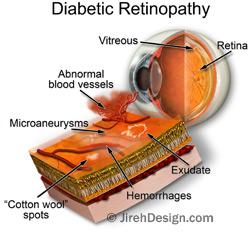Diabetic eye disease Tampa Bay area, Clearwater
Diabetic eye disease affects approximately 7-10 percent of the population in Tampa Bay and Clearwater area and 8.3% of the […]


Diabetic eye disease Tampa Bay area, Clearwater
Diabetic eye disease affects approximately 7-10 percent of the population in Tampa Bay and Clearwater area and 8.3% of the […]
Diabetic eye disease affects approximately 7-10 percent of the population in Tampa Bay and Clearwater area and 8.3% of the population in the United States.
Diabetic retinopathy refers to a group of eye problems that people with diabetes may face as a complication of this disease.
Click here to see “Human Eye” animation
These diabetic eye diseases can cause severe decrease in eyesight or even blindness.
Diabetic eye disease may include:
- Diabetic Retinopathy–damage to the blood vessels in the retina.
- Cataract–clouding of the eye’s lens.
- Glaucoma–increase in fluid pressure inside the eye that leads to optic nerve damage and loss of vision.
- Cataract and glaucoma also affect many people who do not have diabetes.
What is the most common diabetic eye disease?
 Diabetic Retinopathy
Diabetic Retinopathy
Retinopathy is a leading cause of blindness in American adults. It is caused by changes in the blood vessels of the retina. In some people with diabetic retinopathy, retinal blood vessels may swell and leak fluid. In other people, abnormal new blood vessels grow on the surface of the retina. These changes may result in decreased eyesight or blindness.
Who is most likely to get diabetic retinopathy?
Anyone with diabetes. The longer someone has diabetes, the more likely he or she will get diabetic retinopathy. Nearly half of all people with diabetes will develop some degree of diabetic retinopathy during their lifetime.
Diabetic Eye Symptoms
Often there are none in the early stages of the disease. Eyesight may not change until the disease becomes severe. Nor is there any pain. Blurred vision may occur when the macula–the part of the retina that provides sharp, central vision–swells from the leaking fluid. This condition is called macular edema. If new vessels have grown on the surface of the retina, they can bleed into the eye, blocking vision. But, even in more advanced cases, the disease may progress a long way without symptoms. That is why regular eye examinations for people with diabetes are so important. If you have diabetes, you should have your eyes examined at least once a year. Your eyes should be dilated during the exam. That means eye drops are used to enlarge your pupils. This allows the eye care professional to see more of the inside of your eyes to check for signs of the disease.
Diabetic Eye Disease Treatment
Your eye care professional may suggest laser surgery in which a strong light beam is aimed onto the retina to shrink the abnormal vessels. Laser surgery has been proved to reduce the risk of severe vision loss from this type of diabetic retinopathy by 60 percent. If you have macular edema, laser surgery may also be used. In this case, the laser beam is used to seal the leaking blood vessels. However, laser surgery often cannot restore vision that has already been lost. That is why finding diabetic retinopathy early is the best way to prevent vision loss.
Recently, anti-VEGF drugs were approved for the treatment of diabetic macular edema. Anti-VEGF drugs work by blocking or suppressing the formation of abnormal new blood vessel growth in the retina — the light-sensitive, multi-layered tissue that lines the back of the eyeball. These abnormal new blood vessels leak and cause fluid build-up, or edema, in the layers of the retina — reducing vision.
In diabetic retinopathy, new blood vessel growth can not only cause edema in the retina, but it can bleed into the retina or the vitreous, causing rapid vision loss.
Prevention
The Diabetes Control and Complications Trial (DCCT) showed that better control of blood sugar level slows the onset and progression of retinopathy and lessens the need for laser surgery for severe retinopathy. The study found that the group that tried to keep their blood sugar levels as close to normal as possible had much less eye, kidney, and nerve disease. This level of blood sugar control may not be best for everyone, including some elderly patients, children under 13, or people with heart disease. So ask your doctor if this program is right for you.
How common are the other diabetic eye diseases?
If you have diabetes, you are also at risk for other diabetic eye diseases. Studies show that you are twice as likely to get a cataract as a person who does not have the disease. Also, cataracts develop at an earlier age in people with diabetes. Cataracts can usually be treated by surgery.
Glaucoma may also become a problem. A person with diabetes is nearly twice as likely to get glaucoma as other adults. And, as with diabetic retinopathy, the longer you have had diabetes, the greater your risk of getting glaucoma. Glaucoma may be treated with medications, laser, or other forms of surgery.
What research is being done?
Much research is being done to learn more about diabetic eye disease. For instance, the National Eye Institute is supporting a number of research studies in the laboratory and with patients to learn what causes diabetic retinopathy and how it can be better treated. This research should provide better ways to detect and treat diabetic eye disease and prevent blindness in more people with diabetes.
What can you do to protect your vision?
Finding and treating the disease early, before it causes vision loss or blindness, is the best way to control diabetic eye disease. So, if you have diabetes, make sure you get a dilated eye examination at least once a year.
Dr. Deupree is a retina specialist in Tampa Bay, Clearwater, Florida area seeing diabetic eye patients.
See also…
Click here to watch an Avastin injection animation
Diabetes management for better vision
Interactive Human Eye animation
Some Info, courtesy of the National Eye Institute







